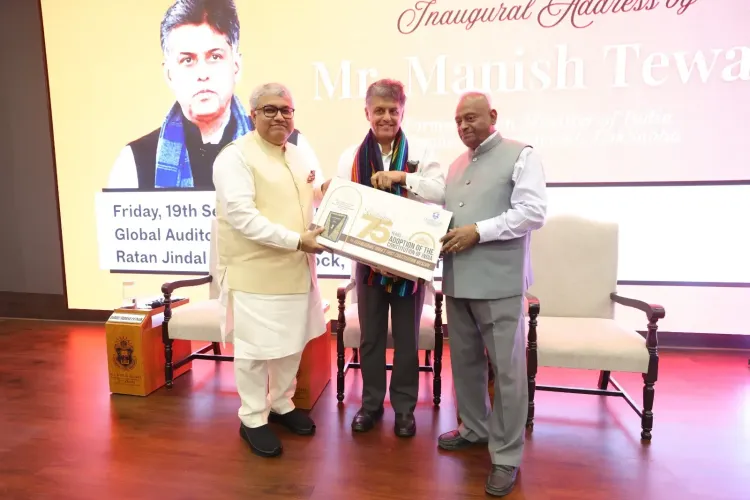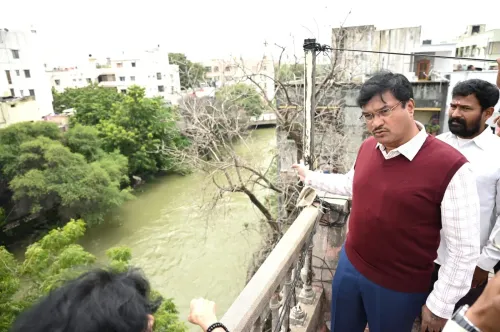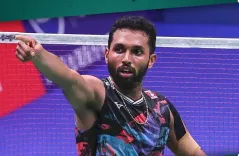Will Self-Reliance and Multi-Alignment Shape India’s Future? Manish Tewari at Jindal Policy Conclave

Synopsis
Key Takeaways
- Importance of political stability for India's future.
- Need for social cohesion in a diverse country.
- Focus on economic prosperity to assert global influence.
- Role of self-reliance in navigating global challenges.
- Multi-alignment as a strategic approach for India.
Sonipat, Sep 22 (NationPress) “In 2047, India will mark the centennial of its independence and celebrate the culmination of the world’s first peaceful struggle for liberation, a journey that stands unrivaled in human history. It is crucial to ensure that democracy remains the cornerstone of India. This is especially pertinent as neighboring nations have been subjected to undemocratic shifts in power due to the disconnect between the aspirations of youth and the offerings of their governments,” remarked Manish Tewari, Former Union Minister and Lok Sabha MP, during his inaugural address at the Jindal Policy Conclave, titled: India and the World - Inception Of Ideas For Viksit Bharat.
“Humanity is witnessing a rare occurrence of multiple conflicts unfolding around the globe simultaneously. India must navigate the upcoming decades as a new world order is being established. Two guiding principles are evident: one is the practice of non-alignment, now termed multi-alignment, and the other is self-reliance. It is a testament to the insight of the founders of modern India that they established the groundwork for our strategic autonomy by diligently pursuing both self-reliance and non-alignment, principles that have served India well over the last seventy years. To succeed, we must first strive for political stability, followed by fostering social unity in our diverse nation, where individuals are distinguished by various religions, languages, and customs, yet united by the historical continuum known as India. Additionally, it is imperative to address income and opportunity inequality. Only by achieving political stability, social cohesion, and economic prosperity can we assert our true weight on the global stage. It is essential to collaborate, exchange ideas, and envision how India can evolve into the most powerful, influential, and humane civilization in the forthcoming decades,” Tewari expressed.
Professor Dabiru Sridhar Patnaik, Registrar at O.P. Jindal Global University, welcomed the esteemed audience, stating, “We aspire to be a university that cultivates global leaders. The School of Government and Public Policy exemplifies our commitment to rigorous, evidence-based frameworks for policy and ethical leadership. In a swiftly changing and complex world, public policy must serve not only as a tool for governance but also as a means of aspiration and innovation. It is indeed a compass that directs national ambitions into tangible actions. At JGU, our goal is to shape the future of both India and the world through fostering innovation.”
Prof. R. Sudarshan, Dean of the Jindal School of Government and Public Policy, noted, “Public policy in India has gained unprecedented significance in an era characterized by complexity, scale, and global interdependence, transcending administrative boundaries to encompass diverse disciplines, ideas, and identities. As India approaches its centenary of independence, public policy has become central to shaping the nation’s developmental path. The Jindal School of Government and Public Policy (JSGP) pioneered public policy education in India during its formative years in academia, establishing it as both a rigorous academic field and a catalyst for social impact. Today, JSGP stands as a leading institution rooted in critical thinking, interdisciplinary research, and ethical leadership, equipping students and professionals to tackle real-world challenges through evidence-based policy frameworks.”
Aligned with its mission, the Jindal Policy Conclave 2025 aims to bring together thought leaders, policymakers, academics, scholars, industry experts, and emerging policy professionals for focused dialogue on India’s future, creating a robust nexus between these sectors.
With India on the cusp of a new development era, the theme “The Inception of Ideas for Viksit Bharat” holds significant urgency, reflecting a clear commitment to shaping its future through actionable ideas and collective engagement.
Key speeches included The Importance of Part IV of the Constitution - The Directive Principles of State Policy in constructing Viksit Bharat by Hon’ble Justice U.U. Lalit, Former Chief Justice of India.
The closing remarks were delivered by Professor (Dr) Namesh Killemsetty from the Jindal School of Government and Public Policy.
The two-day policy dialogue will feature various panels and discussions with renowned academics, experts, and thought leaders, involving JGU faculty and students.
Topics of discussion will include Electoral Reforms: India’s Power Play in Redrawing Boundaries & Redefining Elections; One Earth, One Family, One Future: India’s Greenprint for Energy Revolution, Climate Resilience & Environmental Revival; Rewiring Urban Governance: Addressing Core Issues Beyond Rhetoric -- Streets, Sanitation, and Services as the New Urban Mandate; Screens, Stories and Regulation: Navigating India’s Media and Entertainment Landscape led by Mahima Kaul, Director of Public Policy & Global Affairs at Netflix.
The Valedictory Address was presented on the theme ‘We the Nation Builders’ by Armstrong Pame, Joint Secretary of the Department of Higher Education, Ministry of Education, Govt of India.









